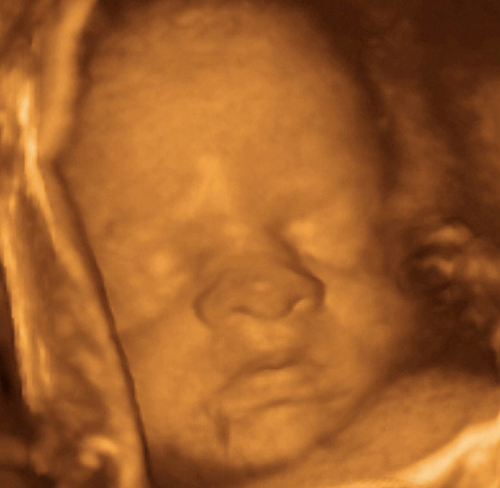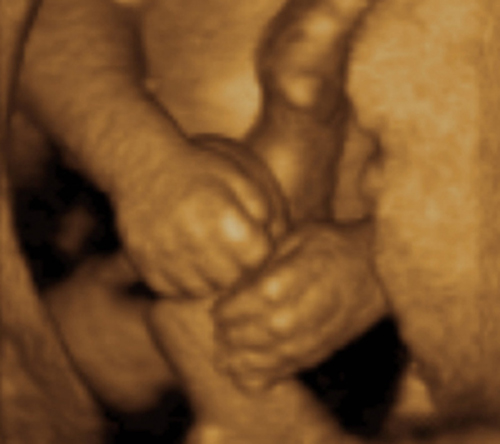You are 30 Weeks and 4 Days 66 days to go…
In the uterus and in the first months of his life, your baby relies on your immunity to various infections.
Your baby today
In this 3D scan the baby’s arm is held up next to the face. This
type of scan shows external features but also looks inside the baby in
3D so you may see some parts of your baby “through” an arm or leg. Here,
the baby’s ear can be seen through the arm.

If your immune system thought your baby was foreign,
it would mount an attack on him. You and your baby are designed so that
this does not happen. Your baby does not have the ability to produce
antibodies (which would attack you) in the uterus: he relies completely
on you to protect him from infection, not only in the uterus but also
after birth. Protection after birth is possible because antibodies from
your immune system cross over the placenta into your baby’s bloodstream,
while you’re pregnant. If you have immunity to a disease such as
measles, mumps, polio, and many other severe infections, your baby will
carry your antibodies to these conditions. This so-called passive
immunity is lost with time and it is for this reason that, from two
months onward, your baby will require a program of immunizations to
protect against these and other illnesses.
… Your body
There have been numerous studies
over the past few years involving women exercising while they’re
pregnant. The bottom line is that exercise performed effectively and
safely, at a moderate intensity and in healthy women, is beneficial.
In addition to being
good for your health and making you feel more energized, exercising will
get you into great shape for labor and childbirth, which is, in effect,
a workout!
Here are the myths:
Exercising will harm my baby if I move too much. Your baby is protected by amniotic fluid and nourished by the placenta. By keeping within safe exercising guidelines ,
and not doing any high-impact sports or activities where you are at
risk of falling or injuries, you are not putting your baby at risk.
Exercise will use up some of the nutrients my baby needs.
Your baby’s growth will be monitored at doctor appointments, so you and
your doctor will be able to tell whether your baby is growing at a
usual rate or whether you should increase your calorie intake. If you’re
concerned, increase your calorie intake on the days that you exercise.
Doing abdominal exercises will harm the baby.
You can do abdominal exercises but you should not do abdominal
exercises lying on your back in the second and third trimesters. The
risk of lying on your back is that the baby can press down on the vena
cava (the large blood vessel that returns blood to your heart). This
causes your blood pressure to fall and compromises the oxygen flow to
the baby. The first sign of a problem will be feeling dizzy: if you roll
on to your left side, any symptoms should disappear. Don’t hesitate to
consult your doctor if you’re concerned. The abdominal exercises shown
on page 250 give you some great ways of doing safe abdominal exercises
that do not put you or your baby at risk.

You are 30 Weeks and 5 Days 65 days to go…
If you want a home birth atmosphere with additional support, consider having your baby in a birthing center.
Your baby today
Here the hands are holding the umbilical cord as it arises from
what will become the belly button, or umbilicus. The umbilical coils and
its covering of firm, clear jelly protect the cord from kinking and
prying fingers.

Birthing centers
give moms-to-be a labor experience different than that of a hospital.
The emphasis is on a natural birth. They can be attached to a hospital
or on a separate site. Some hospitals have a birthing center facility in
the maternity unit. Since the majority of women give birth without
needing medical intervention, these centers provide a good alternative
to a more medicalized hospital environment. The environment in a
birthing center tends to be more relaxed and flexible than a hospital
environment. You’ll have continuous support from a combination of labor
nurses and midwives. Your doctor may also be affiliated with a birthing
center. Furthermore, the medical team in these centers is very
experienced at handling a birth without medical intervention. All of
these factors therefore increase your chances of having a
straightforward birth. To be give birth in such a center, you need to
have had an uncomplicated pregnancy and be unlikely to require
specialized medical care or monitoring in labor and birth. If
complications did occur, you would be transferred to the closest
hospital, although this is rare.
Sit down with your partner
and discuss what you both would like to happen during the whole labor
and birth experience. Then start putting your hopes, thoughts, and
feelings into a birth plan that you can discuss and expand on with your
doctor.

… Doctor
| Q: |
I’m having a home birth. Can my older children, four and six, be present at the birth?
|
| A: |
There is nothing more wonderful or miraculous than the birth
of a baby, and it’s natural to want your older children to be present
and witness it for themselves. However, do consider this carefully
before you give them the go-ahead. For one thing, even the easiest of
labors are painful, and young children will be distressed to see mom in
pain. What’s more, they may be slightly daunted to see their new sibling
emerging from your body, probably covered with various substances.
Having said that, many kids handle the experience well if they know what
to expect, so outline everything, and explain that any cries, shrieks,
or swearing on your behalf are necessary to help get the baby out. You
could also mention that you may cry or even vomit, just so they are
prepared. Let them know to expect some blood, and that baby will be
attached to a (rather gruesome!) cord. If they’re squeamish, get them to
position themselves by your head, or bring them in immediately after.
|
Home is where the heart is
The prospect of sleeping in your own bed
and being taken care of by people who love you are reason enough to opt
for a home birth. It’s natural to feel less inhibited at home, and you
may be more inclined to move around more and for longer, be as vocal as
you like, use gravity, and try different birthing positions, all of
which can make labor and delivery shorter and easier. Your midwife will
explain what’s involved, so seek her advice. On the big day be flexible:
you may want to head for the hospital.
Your baby
still has slender arms and legs and little fat under the skin. His skin
is covered with fine lanugo hair and waxy vernix and he now has
eyebrows and eyelashes—his first mature hairs.
